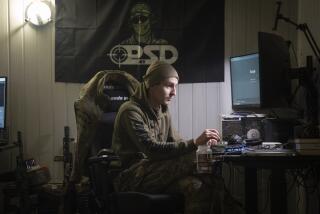BBC Experts Listen, Learn About Region : Intelligence: Linguists decipher radio transmissions. Paying clients get a firsthand look at what combatants are saying.
- Share via
LONDON — In an old Georgian mansion west of London, scores of linguists are working around the clock monitoring thousands of words from radio transmissions from the Middle East.
The monitors, employed by the British Broadcasting Corp., seek to give a comprehensive report on what Middle Eastern countries are saying about the conflict.
Its analysts are also looking at the bits and pieces from official radio broadcasts to find patterns in the daily product from a contemporary Tower of Babel.
The BBC operation in Caversham audits about 500 foreign-language broadcasts daily from around the world and processes up to 5,000 messages--ranging from short announcements to long speeches--translating, editing and distributing the reports to customers.
And now that the Gulf War is under way, the BBC, which is especially focusing on the Middle East, offers paying clients--including media, the British government and presumably Britain’s intelligence service--a firsthand look at what combatant governments are saying.
“The staff here listens to a million words a day,” says Adam Raphael, a BBC correspondent assigned full time to Caversham to report several times daily on the latest translations of statements from the Gulf states, most notably Iraq. “They publish more than 100,000 of those words.”
The monitors’ product is published in a daily record, the “Summary of World Broadcasts,” whose popularity has increased sharply among subscribers since the Gulf War began. Subscribers pay a basic rate, about $200 a day, for the service. It is delivered by telex, fax or mail.
Medium- and high-frequency broadcast signals from the Middle East are picked up by a satellite dish and moved by land line to Caversham three miles away. The special BBC operation runs 24 hours daily with about 250 monitors, translators and editors--including at any time a dozen Arabic speakers, as well as Farsi experts who handle broadcasts from Tehran.
The Arabic experts focus on the three Iraqi stations: Baghdad Radio, the Iraqi foreign broadcast service; the Voice of the Masses, the domestic service, and the Mother of Battles, a new station, possibly from Kuwait.
Besides sifting through broadcasts, the monitors--who include two Iraqi exiles--listen for trends and changes in mood. Raphael points out that Caversham first noted the calls by Baghdad for acts of international terrorism two weeks ago; these calls were followed by scattered incidents in places from the Philippines to Algeria. Because of the sensitivity of their work, the monitors asked not to be named or photographed.
Their work in the stately building overlooking the Thames River near Reading is funded by the BBC’s World Service, which is supported by the British government. The British Foreign Office and the Ministry of Defense both are clients of the BBC service. It is freely available to other officials and governments, if they pay the fee.
Caversham officials emphasize that they are not involved in espionage; they only monitor channels available to anyone who wants to spend the time, effort and money to listen in.
The British government runs its own undercover radio monitoring service, the General Communication Headquarters, which is the equivalent of the U.S. National Security Agency’s worldwide listening network, tuned in to other nations’ private military and diplomatic communications.
Linda Eberst, who is in charge of the BBC’s Middle East monitoring, said Caversham picks up all open transmissions, regardless of how anti-British they may be, declaring: “We report it, if it is interesting and useful.”
More to Read
Sign up for Essential California
The most important California stories and recommendations in your inbox every morning.
You may occasionally receive promotional content from the Los Angeles Times.








